Search the Special Collections and Archives Portal
Search Results

Transcript of interview with Eldon Cooper by Kamal Whilelm, March 3, 1975
Date
Archival Collection
Description
On March 3, 1975, Kamal Wilhelm interviewed Eldon G. Cooper (born 1922 in Overton, Nevada) about his experiences in Southern Nevada. Also present are Cooper’s wife and several unnamed adults in the background. Cooper first talks about his background and his eventual move to Las Vegas before describing the recreational activities in which he and his family took part. He later describes the atomic testing, environmental changes, modes of transportation, social changes, and tourism in Las Vegas. Cooper also discusses the Stewart Ranch, and his wife describes the setting of multiple photographs taken of properties in the Downtown Las Vegas area.
Text

Transcript of interview with Dorothy George by Claytee White, October 13, 2003
Date
Archival Collection
Description
After serving as a nurse in World War II in Hawaii, Okinawa and Japan, Dorothy returned home to Chippewa Falls, Wisconsin. She experienced a particularly bad winter and she set out for California but stopped in Las Vegas to visit the family of her traveling companion, a girlfriend from her home town. The girlfriend returned to Wisconsin and George applied for a nursing license and got it within three days. She never left. Dorothy met her husband while working the night shift at Clark County Hospital. He would come in regularly to assist his patients in the births of their babies. Their occupations and their service in World War II drew them together in a marriage that has lasted over fifty years. From 1949 to this interview in 2003, Dorothy George has seen Las Vegas grow from a town that she loved to a metropolitan area that is no longer as friendly. She reminisces about the Heldorado parades, family picnics at Mount Charleston, watching the cloud formed by the atomic bomb tests, raising six successful children, leading a Girl Scout Troop, and working in organizations to improve the social and civic life of Las Vegas.
Text
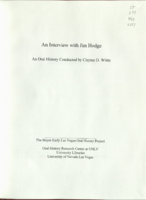
Transcript of interview with Jim Hodge by Claytee White, April 13, 2009
Date
Archival Collection
Description
Jim Hodge describes an active and success filled life in this narrative. Born and raised in the South, Jim enlisted in the Navy at the young age of 17, just as World War II was winding down. His primary job was that of a cook. He became smitten with the life of an entertainer after participating in a play and headed for Hollywood in 1952. It was there that he auditioned for Donn Arden, who organized and directed Las Vegas shows. Though he didn't get the part, he did get hired to be a singer for a show featuring Betty Grable. Thus his career was launched and would span the heyday of Las Vegas entertainment from the 1950s to the 1970s. Jim talks about the people, shows and places that touched his life. He also offers thoughts about the changes in the Vegas entertainment scene as well as shares his relationship with his church over the past 40 years.
Text
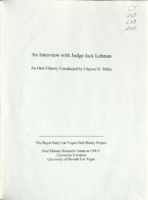
Transcript of interview with Jack Lehman by by Claytee White, October 17, 2007
Date
Archival Collection
Description
Judge Jack Lehman is living the life we should all strive for - a wonderful family, a work ethic that has allowed him to serve others while enjoying a magnificent life and above all a great love affair with his beautiful artistic wife, Lou Lou. From Chemnitz, Germany, at the beginning of the Nazi reign to a prominent citizen of Las Vegas, Lehman lives an extraordinary Las Vegas life. Born in Germany in the late 1920s, Jack and his sister were sent to the United States in 1935 and after a series of living situations including a orphanage in New York, they were adopted by the Lehman family in Lake Arrowhead, California. As a young boy, he wanted to become a lawyer. After a degree from Berkeley, two tours of military duty, a stint in radio broadcasting, and serving as the Director of the Nevada Department of Economic Development, he entered law school at USC. Lehman's career in the legal field began at the largest law firm in the city - Lionel Sawyer and Collins - and then into private practice and on to the bench as a District Court judge appointed by Governor Richard Bryan. In February 2008, he was honored by judges and friends statewide as the founder of Nevada's Adult Criminal Drug Court Program commonly known as "drug court." Washoe County District Judge Peter Breen said it best, "The state is a much better place because of Jack. All those people came back from the abyss of addiction because of Jack."
Text

Transcript of interview with Jackie MacFarlane by Claytee White, February 4, 2010
Date
Archival Collection
Description
Jacqueline "Jackie" Tilman MacFarlane was born in her grandmother's Las Vegas home at H Street and Clark Ave. Her father John Franklin Tilman was a construction worker at Boulder Dam (now Hoover) in early 1930s. Jackie recalls her family having to move several times the Great Depression and living in rural Nevada. Eventually the family came back to reside in Las Vegas. After graduating from high school, she took a waitress job at the Spot Cafe (Main & Charleston) and then at the Askew Drive-In. It was there that she met her future husband, David MacFarlane, an Air Force cadet. David continued to work at Nellis Air force Base as a civilian until he retired in 1987. Jackie describes raising her children in Fair Circle neighborhood during the 1950s and 1960s; a time when Las Vegas was just a "small town of 50,000." She felt safe and always found work in the casinos. Her work career included being a change girl at the Mint of Fremont St. and working as the front office cashier at the Desert Inn and then working at the Sands Hotel and Casino. Eventually she became a night auditor at Sands Hotel and Casino and then at Sahara Hotel and Casino from 1970-1977. She remembers working nightshift, coming home to get the kids and husband off to school and work. After leaving Sahara, she began selling Vanda cosmetics as a home business, something she still does today.
Text
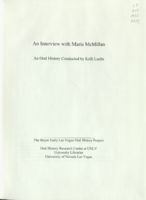
Transcript of interview with Marie McMillan by Kelli Luchs, September 15, September 23, October 1, & November 24, 2009
Date
Archival Collection
Description
From an early age, Marie McMillan displayed an adventurous sensibility, a characteristic that is revealed in how life unfolded for her. In this multi-part interview, Marie begins with her birth in 1926 California, and continues with stories of her childhood recollections of the Depression era, her longstanding closeness with Nanny, her maternal grandmother, and memories of Old Bent, her paternal grandfather. She enjoys a flirtatious vitality and attends college for a year. However, as World War II begins to infest the U.S., Marie finds herself falling for a young merchant marine named Duke Daly. They marry, have two children, and live a transient life moving about California and Hawaii as he goes to school, then seeks and finds employment in a postwar economy. By the late 1950s, the Daly household is stressed and begin to split time between California and Las Vegas. Marie holds positions that require security clearance and administrative talents. In 1961, Duke passes away a
Text
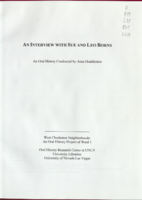
Transcript of interview with Leo Borns and Sue Easley Borns by Anna Huddleston, March 21, 2014
Date
Archival Collection
Description
Leo and Sue (Easley) Borns came to Las Vegas in 1962 to begin an architectural career that would last forty-four years in Southern Nevada. Leo Boms worked for various firms in Las Vegas before developing a reputation as "F. Borns, Architect". He has gone on to design buildings for state public works, Clark County, the City of Las Vegas, Clark County School District, churches, and private home owners. Rarely taking a job outside of Southern Nevada, Leo Boms' intent was to develop an architecture considered indigenous to the area while keeping the conservation of energy and technology as prime importance. Mr. and Mrs. Boms, after living in the area for approximately five years, decided to purchase a home on Strong Drive in McNeil Estates where they raised their three children. Active in social and philanthropic organizations, both Leo and Sue have become acquainted with numerous area personalities. Mr. Boms is most proud of being a part of the development of the Kiwanis Water Conservation Park although his structural designs can be seen throughout the Southern Nevada area. At the age of 77, he closed his office but remains an integral influence on the Greater Las Vegas area.
Text
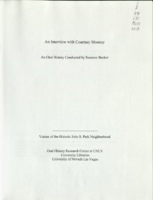
Transcript of interview with Courtney Mooney by Suzanne Becker, July 30, 2007
Date
Archival Collection
Description
Courtney Mooney is the Urban Design Coordinator for the City of Las Vegas. Her job description includes a knowledge of historic preservation, which is her passion. In this interview she shares her professional and personal thoughts about John S. Park Neighborhood. She moved to John S. Park in 2002. As a professional she explains that "how I look at preserving neighborhoods or buildings, is more of a community preservation, not saving the individual building for the individual building's sake..." Courtney offers a big picture of the neighborhood's past, present and future. John S. Park, like so many other Las Vegas neighborhoods, was built during World War II and has been affected by history of segregation and the wave of changing demographics, and the work that went into the plan and requirements to be designated a historic neighborhood. Courtney provides a summary of the story about the land, its ownership and what lead to the foundation of the neighborhood: from John S. Park to George Franklin and John Law, to Mary Dutton and explains how the proposed development of the land differed from other communities being built to FHA standards and specifics that declared Las Vegas a Defense City in the 1940s. She lists the factors that made the neighborhood a logical and important target for the historic designation, a small neighborhood tucked away, that is "a snapshot of the types of people that were coming here," filled with community leaders, entrepreneurs, blue-collar and casino workers. She also mentions about the missed opportunity of the Las Vegas High School neighborhood for preservation while supporting the John S. Park designation.
Text
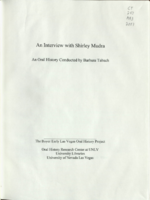
Transcript of interview with Shirley Mudra by Barbara Tabach, November 30, 2011
Date
Archival Collection
Description
When Shirley Mudra arrived in Las Vegas in 1966, she came tearfully. But as the wife of a Nevada Test site manager and mother of three young children, she was accustomed to adapting. Indeed, she adapted and remains a Las Vegas resident. Shirley and her husband Paul (above photo) met while both were in the Air Force. She was the daughter of a Pittsburgh, Pennsylvania, homemaker and railroad worker and describes her upbringing. She also talks about her joy of enlistment in the Air Force and the transition to being a wife, mother and her employment at the Department of Energy. Shirley's narrative includes details of early Las Vegas life, raising children here and becoming part of the changing community through friendships.
Text

Transcript of interview with Amber Allan by David Schwartz, December 21, 2016
Date
Archival Collection
Description
Amber Allan grew up in West Virginia and moved to Las Vegas at the age of 16. She entered the gaming industry in 2000 as a change person at Arizona Charlie’s Boulder where she later held the positions of floorperson and assistant shift manager. Allan would eventually move to Santa Fe Station in 2005 as relief shift manager, later to the Texas Station as a shift manager, and then to Palace Station in 2008 into the slot operations and technical manager role. She then returned to Texas Station at the end of 2008 as director of slot operations and then moved to Aliante Station into the same role in 2009. Allan started at Konami Gaming, Inc. in 2012 where she has worked as an analyst, product specialist, and, currently, as technical sales executive. The interview with Allan begins with her discussion of moving to Las Vegas and the experiences and roles she held as she started in the gaming industry. She discusses the various responsibilities she had in those roles, the types of skills required for them, and the kinds of disputes that are handled in certain supervisory positions. Allan also mentions and discusses the topic of hold percentage as it relates to slot and video poker players. She later describes her philosophy on what makes a good slot floor and also what customers are looking for in slots. Allan then provides the details of her move to the manufacturing side of the slot industry, and she gives her thoughts on what makes both a good and bad slot manager. The interview then shifts to the discussion of free slot play; ticket-in, ticket-out; changes in slot management; and the future of slot machines. The interview concludes with Allan’s discussion of her personal gambling as well as her advice for young people who want to go into the slot industry.
Text
